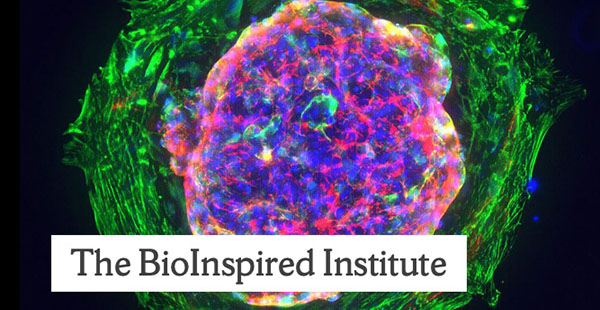Science and Mathematics
MRSEC Brainstorming: Heterogeneous Materials Composed of Liquids and Solids
January 20, 2022 at 4:00pm – 5:00pm EST
Virtual (See event details)
This event has already occurred. The information may no longer be valid.

The BioInspired Institute is holding additional brainstorming sessions to start identifying promising sub-projects (often involving 2-4 PIs) that can fit under two proposed Interdisciplinary Research Groups (IRGs). This session will focus on a proposed IRG Heterogeneous Materials Composed of Liquids and Solids:
Optimizing the shape and mechanics of the solid to facilitate specific desired properties of the hybrid, such as allowing actuation (possibly with snap-through instabilities) of the solid or maximizing fluid flow or diffusion through the hybrid material. Applications include materials that can be self-healing and macroscopically large, or bioinspired systems that can actuate in new ways because we can really control the fluid-solid interactions. Novelty is treating the fluid as key part of the material itself. This could potentially be theory-led. Potential needs:
- Expertise in vasculature/3D printing
- Expertise in optimization to address optimization principles depending on the design goals
- Expertise in thin films and bacterial biofilms with wrinkles could be relevant
- Expertise in underwater adhesion
The Materials Research Science and Engineering Center (MRSEC) is the major center funding mechanism for the Division of Materials Research (DMR) at NSF. MRSECs must be composed of 2-3 “Interdisciplinary Research Groups” (IRGs).
- Successful MRSECs typically identify 8-10 faculty with major involvement in each IRG (the RFP allows 6-12); these folks often have prior DMR funding.
- An IRG must have a cohesive research theme, and a big component during review is whether the theme is 1) really exciting/driving the field in a new direction and 2) whether it require diverse expertise.
- The focus of the IRG must be materials, in topics funded by DMR. It cannot be focused on other subjects of broader NSF interest (biology, biophysics, information science, etc.)
- Different IRGs must be distinct. There can be synergies, but each IRG is evaluated separately first, and synergies can be in infrastructure, education, etc. and not necessarily in research overlap
This event was published on January 11, 2022.
Event Details
- Category
- Science and Mathematics
- Type
- Workshops
- Region
- Virtual
- Open to
- Faculty
- Group
- BioInspired
- Contact
- Jeremy Steinbacher
jlsteinb@syr.edu
- Accessibility
- Contact Jeremy Steinbacher to request accommodations
